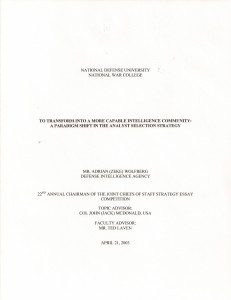
This post has four parts: 1) Chuck Spinney's long commentary; 2) The original article with attachments from TruthDig; 3) a ripost making three points about Chuck's comments; 4) Chuck's answer and a short comment from Robert Steele
The Eikenberry Cables Turn Sun Tzu on His Head: Domestic Politics and the Art of Asymmetrical Bureaucratic War
In the opening line of Book 1 of Sun Tzu's classic, The Art of War (circa 400 BC), the first treatise ever written on the subject, the Chinese master said,”War is a matter of vital importance to the State; the province of life and death; the road to survival or ruin. It is mandatory that it be thoroughly studied.” [1] He then goes on to describe a systematic method for assembling the information needed to make a rational decision to go to war. Today, in Pentagonese, we would call his method a “net assessment,” that is to say Sun Tzu described a very thoughtful way to perform a comparative analysis of one's own strengths and weaknesses with those of the adversary.
Sun Tzu's strategic outlook is amazingly relevant to contemporary circumstances; indeed, it is timeless, and I submit it provides the gold standard for for evaluating our own efforts to grapple with the question of going to war or to escalate a war — basically, his advice was simple: know your enemy and know yourself before plunging into war.
Continue reading “Journal: Afghanistan, Sun Tzu, State, & “Intelligence””




 HACKERS ON PLANET EARTH (HOPE)
HACKERS ON PLANET EARTH (HOPE) Phi Beta Iota: Hackers are like astronauts, pushing the bleeding edge of the envelope. If the US Government had listened to us in 1991-1994, cyberspace would be secure today, and we would not be spending $12 billion a year on the cyber-scam game–outsourcing to beltway bandits fighting for the 100 folks that actually know how to do this stuff and can qualify for clearances. Our solution for the regional networks is gong to be multinational and open everything. This event is specifically recommended for young teens who show signs of intelligence and curiosity, and for mid-career officers beginning to realize that 80% of what they do is without merit, seeking a better way. This is where we do the right things righter, not the wrong things righter.
Phi Beta Iota: Hackers are like astronauts, pushing the bleeding edge of the envelope. If the US Government had listened to us in 1991-1994, cyberspace would be secure today, and we would not be spending $12 billion a year on the cyber-scam game–outsourcing to beltway bandits fighting for the 100 folks that actually know how to do this stuff and can qualify for clearances. Our solution for the regional networks is gong to be multinational and open everything. This event is specifically recommended for young teens who show signs of intelligence and curiosity, and for mid-career officers beginning to realize that 80% of what they do is without merit, seeking a better way. This is where we do the right things righter, not the wrong things righter.


